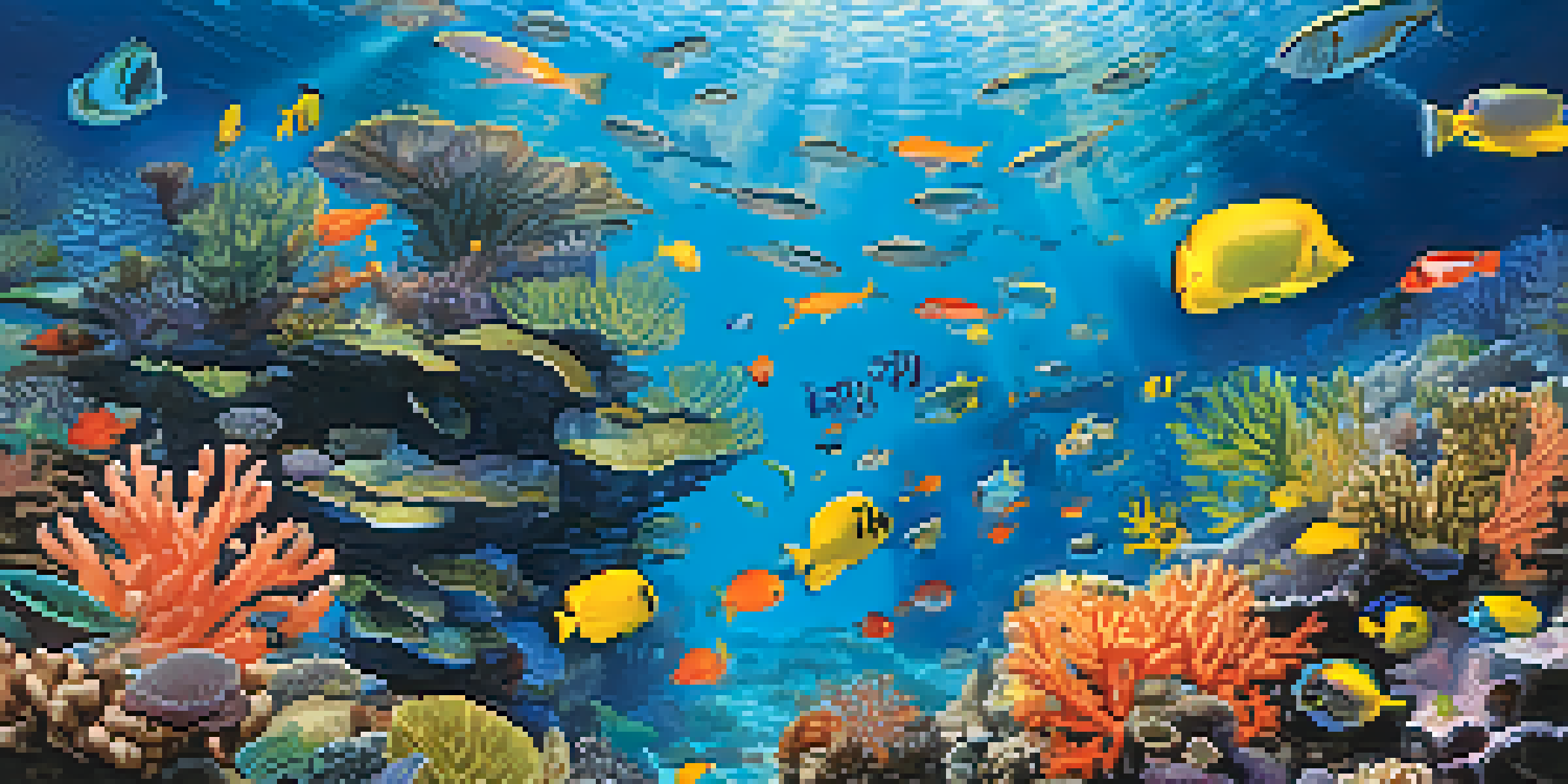The Impact of Climate Change on San Diego Marine Life

Understanding Climate Change and Its Causes
Climate change refers to long-term shifts in temperatures and weather patterns, primarily due to human activities like burning fossil fuels. This buildup of greenhouse gases traps heat in the atmosphere, leading to global warming. In coastal areas like San Diego, these changes significantly affect marine ecosystems.
The climate crisis is not a political issue, it is a moral and human one. It affects us all, and we must act now to protect our planet and future generations.
The ocean plays a crucial role in regulating the Earth's climate, and when it warms, the effects ripple through marine life. Rising sea temperatures can disrupt breeding patterns, food availability, and the overall health of marine organisms. For instance, fish species that thrive in cooler waters may struggle to survive as their habitats warm.
Additionally, climate change can lead to ocean acidification, which occurs when excess carbon dioxide dissolves in seawater. This process can harm shellfish and coral reefs, essential components of marine biodiversity. Understanding these causes is the first step in recognizing their impacts on San Diego's marine life.
Rising Sea Temperatures and Their Effects
One of the most noticeable impacts of climate change in San Diego is the rising sea temperatures. Warmer waters can lead to coral bleaching, a phenomenon where corals expel the algae living in their tissues, causing them to turn white and become more vulnerable to disease. This not only affects the corals but also the myriad of marine species that depend on coral reefs for habitat.

Moreover, many species, such as fish and marine mammals, rely on specific temperature ranges for breeding and feeding. When temperatures rise, these species may migrate to cooler waters, disrupting local fishing industries and altering the ecological balance. For instance, the decline of local fish populations can impact everything from recreational fishing to the diets of predatory species.
Climate Change Impacts Marine Life
Rising sea temperatures and ocean acidification threaten marine ecosystems in San Diego.
The change in water temperature also affects nutrient cycling in the ocean. Warm water can hold less oxygen, which is vital for marine life. This can lead to the formation of 'dead zones'—areas where oxygen levels are too low to support most marine life, further threatening the diversity of San Diego's waters.
Ocean Acidification: A Silent Threat
Ocean acidification is often referred to as the 'silent threat' of climate change. As the ocean absorbs more carbon dioxide, it becomes more acidic, which can severely impact marine organisms that rely on calcium carbonate, like oysters and clams. In San Diego, this poses a significant risk to local fisheries and aquaculture.
We won't have a society if we destroy the environment.
The changing chemistry of the ocean can weaken the shells of these organisms, making them more susceptible to predation and disease. This not only threatens the species themselves but also the entire food web that depends on them. For example, seabirds and marine mammals that rely on shellfish as a food source could face starvation as these populations decline.
Furthermore, coral reefs, which are vital for marine biodiversity, struggle to grow and maintain their structures in more acidic waters. This could lead to the loss of reef habitats, affecting countless marine species and the coastal protection that reefs provide against storms.
Impact on Local Fisheries and Economy
San Diego's economy is closely tied to its marine resources, particularly the fishing and tourism industries. As climate change alters fish populations and their distributions, local fishermen may struggle to find their traditional catches. This can lead to economic hardship for families and communities that rely on fishing for their livelihoods.
Moreover, fluctuations in fish populations can disrupt the balance of marine ecosystems. As certain species decline and others thrive, the entire food web can be affected, leading to unforeseen consequences. For instance, if a particular fish species becomes scarce, its predators may also face food shortages, creating a cascading effect throughout the ecosystem.
Economic Consequences for Fisheries
Changes in fish populations due to climate change pose risks to local fishing industries and the economy.
Tourism is also at risk, as declining marine health can deter visitors who come to enjoy activities like snorkeling and whale watching. Protecting marine life is crucial not only for environmental health but also for maintaining the economic vitality of San Diego.
Biodiversity Loss: A Growing Concern
Biodiversity is essential for resilient ecosystems, and climate change poses a significant threat to marine biodiversity in San Diego. As habitats change due to rising temperatures and ocean acidification, many species are unable to adapt quickly enough. This can lead to a decline in species diversity, which is critical for ecosystem stability.
For example, keystone species, like sea otters and certain fish, play pivotal roles in maintaining the balance of their ecosystems. Their decline can trigger a domino effect, leading to the overpopulation of other species and the degradation of habitats. This shift can result in less resilient ecosystems that are more vulnerable to future environmental changes.
Protecting biodiversity is not just about saving individual species; it's about preserving the intricate web of life that sustains our oceans. Without a diverse range of species, marine ecosystems become less stable and more susceptible to disturbances, further threatening the health of San Diego's coastal waters.
Community Efforts to Combat Climate Change
In response to the threats posed by climate change, San Diego communities are stepping up to make a difference. Local organizations and citizen groups are working tirelessly to raise awareness and promote actions that can help protect marine life. Initiatives like beach clean-ups and educational programs are becoming increasingly common.
Moreover, local governments are implementing policies aimed at reducing carbon footprints and enhancing coastal resilience. These efforts include promoting sustainable fishing practices, protecting coastal habitats, and investing in renewable energy sources. Community engagement is vital, as it empowers individuals to contribute to solutions.
Community Action for Sustainability
San Diego communities are actively engaging in initiatives to combat climate change and protect marine resources.
Collaboration between scientists, policymakers, and the public is essential for creating effective strategies to combat climate change. By working together, San Diego's communities can foster a culture of sustainability that not only benefits marine life but also enhances the quality of life for all residents.
The Importance of Education and Awareness
Education is a powerful tool in the fight against climate change and its effects on marine life. By raising awareness about the challenges facing San Diego's marine ecosystems, we can inspire individuals to take action. Schools, aquariums, and local organizations play a pivotal role in educating the public about the importance of protecting our oceans.
Through programs that focus on marine conservation, the community can learn about the interconnectedness of all life forms and the impact of human actions. For instance, understanding how pollution affects marine habitats can motivate individuals to reduce single-use plastics and participate in clean-up efforts.

Engaging the next generation in environmental stewardship is crucial. By fostering a sense of responsibility and connection to the ocean, we can cultivate future leaders who will advocate for sustainable practices and policies that protect marine life for years to come.